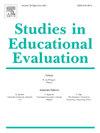学校领导和创新如何塑造各国学生成就的教学途径:来自多层次结构方程模型和决策树分析的证据
IF 2.6
2区 教育学
Q1 EDUCATION & EDUCATIONAL RESEARCH
引用次数: 0
摘要
教育领导、创新和教学在塑造学生成就方面发挥着至关重要的作用。然而,现有文献主要依赖于线性建模方法,并没有着重于对理论进行实质性的测试。本研究采用多层次结构方程模型(ML-SEM)和多层次决策树(MLM树),利用七个国家的PISA-TALIS 2018相关数据,调查学校领导、团队创新、认知激活和学生成绩之间的关系:哥伦比亚;捷克共和国;丹麦;乔治亚州;马耳他;和Turkiye。ML-SEM的研究结果表明,领导对成就没有显著的间接影响。传销树在学校领导、创新和学生成绩之间的关联中突出了国家特定模式,揭示了潜在的非线性关系。这些发现表明,领导力、教学实践和成就之间的关系高度依赖于情境。该研究通过对ML-SEM和MLM树进行比较分析,突出了传统线性模型在教育研究中的局限性,从而为文献做出了贡献。本文章由计算机程序翻译,如有差异,请以英文原文为准。
How school leadership and innovation shape instructional pathways to student achievement across nations: Evidence from multilevel structural equation modeling and decision tree analysis
Educational leadership, innovation and teaching play essential roles in shaping student achievement. However, extant literature primarily has relied on linear modelling approaches and has not focused on substantively testing a theory. The present study employs multilevel structural equation modelling (ML-SEM) and multilevel decision trees (MLM trees) to investigate associations between school leadership, team innovation, cognitive activation and student achievement using PISA-TALIS 2018 linked data across seven countries: Australia; Colombia; Czech Republic; Denmark; Georgia; Malta; and Türkiye. The ML-SEM findings indicated no significant indirect effects from leadership on achievement. The MLM trees highlighted country-specific patterns in associations between school leadership, innovation and student achievement, revealing potential nonlinear relationships. These findings suggest that the relationship between leadership, instructional practices and achievement is highly context-dependent. The study contributes to the literature by offering a comparative analysis of ML-SEM and MLM trees, highlighting traditional linear models’ limitations in educational research.
求助全文
通过发布文献求助,成功后即可免费获取论文全文。
去求助
来源期刊

Studies in Educational Evaluation
Multiple-
CiteScore
6.90
自引率
6.50%
发文量
90
审稿时长
62 days
期刊介绍:
Studies in Educational Evaluation publishes original reports of evaluation studies. Four types of articles are published by the journal: (a) Empirical evaluation studies representing evaluation practice in educational systems around the world; (b) Theoretical reflections and empirical studies related to issues involved in the evaluation of educational programs, educational institutions, educational personnel and student assessment; (c) Articles summarizing the state-of-the-art concerning specific topics in evaluation in general or in a particular country or group of countries; (d) Book reviews and brief abstracts of evaluation studies.
 求助内容:
求助内容: 应助结果提醒方式:
应助结果提醒方式:


